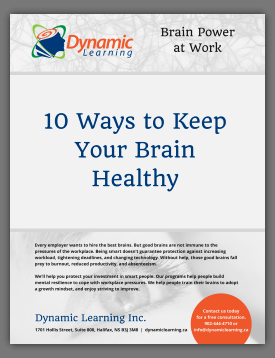How many hours per day do you spend looking at a screen?
To understand how much that matters to your brain, and even more importantly to your children’s brains, please read this summary of a conversation published in the Globe & Mail on February 17, 2018. It’s between Norman Doidge, M.D., a psychiatrist, psychoanalyst and author of The Brain That Changes Itself and The Brain’s Way of Healing, and Jim Balsillie, former co-CEO of Research in Motion (BlackBerry Ltd.), the company that brought the world the first smartphone.
JIM BALSILLIE: Will we ever kick our smartphone addiction?
NORMAN DOIDGE: Kick it? We’re just getting started.
Digital tech is especially good at changing our brains without our awareness. The brain is neuroplastic, meaning it has a property allowing it to change its structure and function in response to experience. Digital technologies are uniquely compatible with the brain because both are electric and also work at high speeds.
BALSILLIE: Are you saying that by using screens 10 hours a day we are, by definition, addicted? *
DOIDGE: For some, “addiction” is just a metaphor meaning “too dependent on” or “a compulsion”.
Many show all the signs of addiction: compulsiveness, loss of control, craving and psychological dependence. Everywhere we see people who must constantly check their phones. According to Adam Alter’s book Irresistible, the average office email goes unanswered for only six seconds. That’s compulsive! They check while driving – which is harmful – and feel agitation when they can’t. They stay up late, stuck on their computers, and then can’t sleep.
If you think of addiction only in quantitative terms, you worry about, “Am I spending too much time online?” But our brain is sculpted by whatever we do repeatedly, and 10 hours a day drives huge qualitative changes. In this case, it’s plummeting attention spans, patience and memories. And social media is creating insecurity. There are significant mental health issues involved.
BALSILLIE: What do you think about personal responsibility?
DOIDGE: I definitely don’t think the blame should rest solely on users, especially since big tech companies now hire hundreds of neuroscientists to learn what will have the stickiest effect on the brain, so they become deliberately addictive to their users.
These people are behavioural psychologists and behavioural neuroscientists whose focus is not therapeutic but on manipulating behaviour to create craving and anxiety if we try to resist it. They are true masters of the art of distraction.
We look because our brain circuitry evolved to make us redirect our interest to something novel. It might be a predator or prey – our next meal – or a mate.
If a quick reward is attached – such as buying a product with a click, a seductive image, a ‘like’, or reading that some rival has just been humiliated – dopamine is released, consolidating that circuit. Our brain reward centre lights up and we feel a thrill. These behaviourists carefully engineer the timing of the stimuli so we form new circuits and get addicted.
BALSILLIE: This is a totally, totally different realm. Today’s smartphones are designed to be highly addictive and extract whatever information they can.
People are paying such a heavy price for their screentime addictions, with all the attendant issues: anxiety, depression, envy, and so on. And everyone is losing their privacy, too.
DOIDGE: Privacy and mental health are inextricably linked, especially for young people. You need periods of privacy to form a self and an identity, a task not completed until at least the late teens.
Having an autonomous, spontaneous self is the result of a long psychological process where children have time to step back from the crowd, and from parents, to reflect. The new phones foster enmeshment with parents and the world, and hamper individuation because kids are over-connected. And peer groups at that age often love to mercilessly hunt down, expose and denounce the eccentricities of emerging individuals.
Kids still long for their peers’ approbation and are terrified of censure. So they keep checking for ‘likes’ and are compulsively “virtue signalling” ** to avoid being disliked, instead of developing actual virtue. This hugely exacerbates the ordinary painful self-consciousness, insecurity, narcissistic vulnerability and drama of young people’s lives. Depression has increased since 2005, most rapidly among people 12 to 17 years old.
BALSILLIE: But if it’s unpleasant, why do kids keep coming back?
DOIDGE: Because that is the world they know – and because it has a shiny surface. But you see what it hides when you take it away.
Kids become insanely anxious when they don’t have their phones. And parents increasingly discipline kids by taking away their phones because that’s the best way to get their attention. Then the kids have a meltdown and feel they’ve just had a part of themselves amputated. They have a point, in a cyborgian kind of way.
DOIDGE: A few years ago, I was at a lecture with clinicians, discussing visual changes, and a preschool teacher there observed that, increasingly, kids weren’t looking at other people when speaking with them.
As the teachers watched the parents picking up kids, they saw they were constantly on their smartphones, not looking at their kids. As cute as these people’s own kids were, in the moment, the kids couldn’t compete with an entire virtual reality engineered to keep their parents distracted.
Digital technologies that claim to be connecting people are also disconnecting us in important ways.
* CNN July, 2016 – A new Nielsen Company audience report reveals that adults in the United States devoted about 10 hours each day to consuming media during the first quarter of this year.
** Virtue signalling: The action or practice of publicly expressing opinions or sentiments intended to demonstrate one’s good character or the moral correctness of one’s position on a particular issue.


